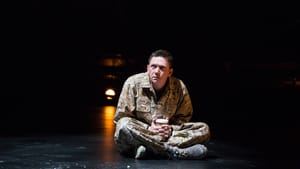Stay in the Loop
BSR publishes on a weekly schedule, with an email newsletter every Wednesday and Thursday morning. There’s no paywall, and subscribing is always free.
A marine in freefall
'Don Juan Comes Home from Iraq' at the Wilma (1st review)

This is a spectacular production on a serious topic. Throughout the one act, one-hour-and-fifty-minute drama, we see creative stagecraft and striking visual images conveying the horrors of the Iraq war and its aftermath.
Don Juan is a Marine captain who returns from Iraq suffering from trauma, partly the result of an incident we see in the play’s first scene. Dazed and hallucinating, Juan time-travels in a foggy world where historic figures such as Benjamin Franklin and Mother Teresa emerge, and Juan has conversations with friends who are dead. He spends a night in the Divine Lorraine Hotel at Broad Street and Fairmount Avenue, which has been closed for 40 years. He also visits a museum with a historic diorama.
In these respects, Don Juan reminds me a bit of Angels in America, though Don Juan lacks the latter play's poetic imagery and hopeful ending. Also, Tony Kushner went to great lengths in Angels to explain the history of Roy Cohn, Ethel Rosenberg, and others, but Paula Vogel chose a more compact form and the historical elements are left obscure. A more direct antecedent is Ödön von Horváth’s Don Juan Comes Back From the War (about World War I); we also see parallels with Georg Büchner’s Woyzeck, written in 1836 but not performed until 1913, which is not about any specific war, but rather what the title character experienced in the military.
Don Juan Comes Home from Iraq is set in Philadelphia, because this is where the Marine Corps got its start in 1775. Local references — the Italian Market, Manayunk, the Mütter Museum, Franklin’s grave, Veterans Stadium, the Eagles, and the MOVE bombing on Osage Avenue — abound.
The play tackles a panoply of relevant issues — the killing of innocent civilians, sexual assault in the military, the enduring trauma when soldiers and marines come home, the failure to adequately help veterans. Many playgoers will see this as a plus; others will feel that the playwright is scattering her shots or checking off a list.
The play’s title hints at a character who revels in seducing women. Here, the opposite is the case. The first several sexual episodes are of women throwing themselves at a reluctant man. Juan keeps telling them, “I feel nothing.” The flashbacks to Juan’s earlier sexual encounters, when he was the aggressor, have no joy either. When he assaulted a woman soldier he told her “it meant nothing.” I’ve never seen so many sexual couplings with such a lack of pleasure. Nor do the women seem appealing. I conclude that we are meant to be viewing all these characters through the eyes of the man, and he sees them as needy and demanding.
A world askew
Our sympathy goes out to Captain Juan, lost and trying “to find my way back,” captivatingly played by Keith J. Conallen. It is heartbreaking when he explains how “sometimes I need to feel nothing.” Kate Czajkowski is lovely as Cressida, the one woman whom Juan remembers — although through a prism, with distortion. Seven other cast members do yeoman’s work as 25 characters.
Just as Juan’s world has been tilted, so too is the set. One of the many striking images is during a battle when marines go over the top of a ridge, are hit by hostile fire, and come tumbling down a steep incline, landing on the stage’s apron.
Blanka Zizka’s direction is breathtaking, with a stark set by Matt Saunders and lighting by Thom Weaver. Wilma dramaturg Walter Bilderback has coordinated workshops for veterans and an exhibition “From War to Home” in the Wilma lobby.
Although the production is gripping, people talking at a post-play reception were trying to understand some of what they saw and heard. This indicates some additional work is needed — perhaps more Kushneresque explicitness.
For a review by Dan Rottenberg, click here.
For a review by Naomi Orwin, click here.
What, When, Where
Don Juan Comes Home from Iraq, a play by Paula Vogel. Blanka Zizka directed. Through April 20, 2014 at the Wilma Theater, 265 S. Broad Street, Philadelphia. 215-546-7824 or wilmatheater.org.
Sign up for our newsletter
All of the week's new articles, all in one place. Sign up for the free weekly BSR newsletters, and don't miss a conversation.

 Steve Cohen
Steve Cohen